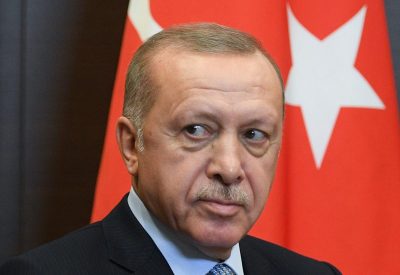Erdogan’s Proposed Islamic Alliance Against Israel Is Pure Demagoguery

His strong rhetoric leads to extreme dopamine bursts from those who think that he’s being sincere, but the rush will inevitably wear off once they realize that he’s not, and some might in turn think less of him afterwards.
Turkish President Erdogan has attempted over the years to present himself as the voice of the international Muslim community, or Ummah, most recently by calling for an Islamic alliance against Israel.
His strong rhetoric about the latest Israeli-Hamas war has earned him the praise of many and also resulted in sharp responses from Israelis, which in turn feed into the perception that he’s seeking to form. All his tough talk is just pure demagoguery, however, since he isn’t willing to go to war with Israel.
The Palestinians claim that over 40,000 of their own have been killed in this nearly year-long conflict that most of their supporters consider to be a genocide. The living conditions in Gaza are atrocious, almost all of the strip has been damaged or destroyed by Israeli bombs, and Egypt continues to keep its border closed to prevent the outflow of refugees into its territory. By all indications, it’s more than a little late for anyone to suggest forming a multilateral alliance against Israel, whether they’re really sincere or not.
Erdogan is a very clever politician and therefore predictably has a few tricks up his sleeve for proposing this so belatedly. First and foremost, he wants to reaffirm Turkiye’s image as the historical protector of the Ummah from back during its Ottoman days, hence why he’s calling so loudly for forming such an Islamic alliance. The second objective is to build upon the aforesaid in order to position Turkiye atop the regional military hierarchy in the minds of those who take his proposal seriously.
Third, he also knows very well that no Muslim country will voluntarily subordinate itself to Turkiye’s implied military hegemony, especially not the Gulf Kingdoms. Their rejection of his proposal or at least public indifference to it can then be spun as passing the buck along to them for supposedly “failing to save Palestine”. The fourth reason is related to the preceding one and concerns the public pressure that Turkiye is coming under from some to cut off Azerbaijan’s oil exports to Israel via Georgia and Turkiye.
Ankara owns neither the pipeline nor the oil that transits through it so any interference with these shipments would be a blatant violation of international law and a stab in its Azeri brother’s back. Its allied relations with Baku mean that Turkish officials can’t pressure their counterparts on this, let alone publicly condemn them for continuing to literally fuel the Israeli economy, but having the public see their lack of response to Erdogan’s proposed Islamic alliance might take some of the heat off of him on this.
And finally, the last goal that he’s seeking to advance is to wage psychological warfare on Israelis by making them fear the grand strategic consequences of continuing the conflict and thus ideally inspiring them to ramp up their protests to stop it, though this could also backfire. By exacerbating their existing siege mindset, he risks some reconsidering whether it’s worth ending the conflict now if all their country’s goals have yet to be achieved seeing as how this Islamic alliance is already forming anyhow.
Altogether, observers shouldn’t forget that Erdogan knows how to play to the Ummah’s crowds, so little of what he says about his plans against Israel should ever be taken seriously. There’s always an ulterior motive or several behind it like in this case as was explained. His strong rhetoric leads to extreme dopamine bursts from those who think that he’s being sincere, but the rush will inevitably wear off once they realize that he’s not, and some might in turn think less of him afterwards.
*
Click the share button below to email/forward this article to your friends and colleagues. Follow us on Instagram and Twitter and subscribe to our Telegram Channel. Feel free to repost and share widely Global Research articles.
Get Your Free Copy of “Towards a World War III Scenario: The Dangers of Nuclear War”!
This article was originally published on the author’s Substack, Andrew Korybko’s Newsletter.
Andrew Korybko is an American Moscow-based political analyst specializing in the relationship between the US strategy in Afro-Eurasia, China’s One Belt One Road global vision of New Silk Road connectivity, and Hybrid Warfare. He is a regular contributor to Global Research.
Featured image: Turkish President Recep Tayyip Erdogan. Photo: Ramil Sitdikov / Sputnik

